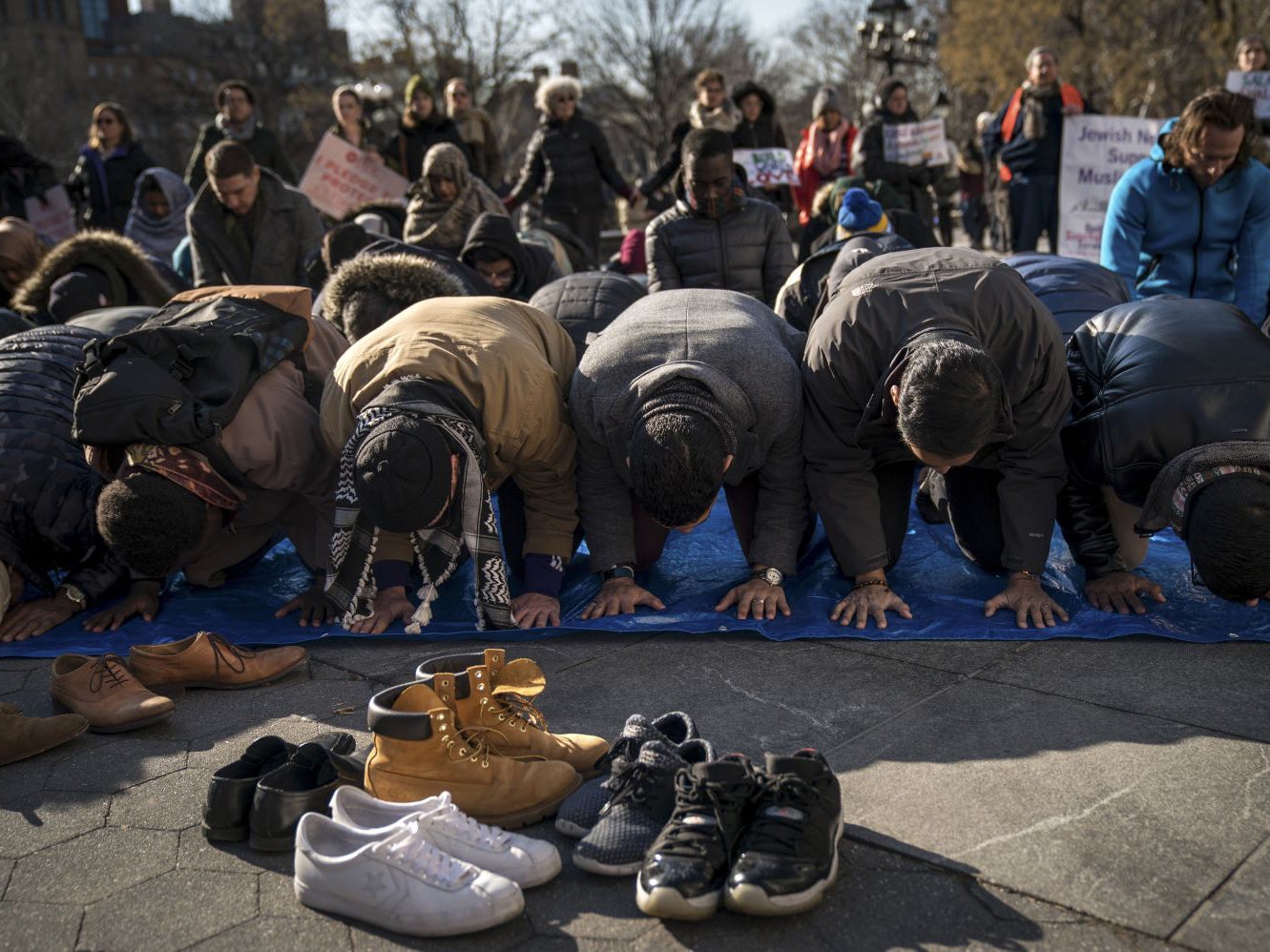Interfaith demonstrators form human chain around Muslims in prayer as they protest Trump travel ban
Supreme Court is to rule on challenges to third version of ban this spring

Your support helps us to tell the story
From reproductive rights to climate change to Big Tech, The Independent is on the ground when the story is developing. Whether it's investigating the financials of Elon Musk's pro-Trump PAC or producing our latest documentary, 'The A Word', which shines a light on the American women fighting for reproductive rights, we know how important it is to parse out the facts from the messaging.
At such a critical moment in US history, we need reporters on the ground. Your donation allows us to keep sending journalists to speak to both sides of the story.
The Independent is trusted by Americans across the entire political spectrum. And unlike many other quality news outlets, we choose not to lock Americans out of our reporting and analysis with paywalls. We believe quality journalism should be available to everyone, paid for by those who can afford it.
Your support makes all the difference.Faith groups protested on Friday against ongoing efforts by the Trump administration to institute a ban on travel by residents of a number of Muslim-majority countries.
The demonstration in New York's Washington Square Park took place a year after Donald Trump's first executive order setting out the ban, which has been blocked by the courts.
The US Supreme Court has agreed to decide the legality of the latest version of Mr Trump's ban, which affects residents from six countries instead of the original seven.
It pits an administration that considers the restrictions necessary for Americans' security against challengers who claim it is illegally aimed at Muslims and stems from Mr Trump's campaign call for a "complete shutdown of Muslims" entering the US.
The policy blocks entry into the US of most people from Chad, Iran, Libya, Somalia, Syria and Yemen.
The justices plan to hear arguments in April and issue a final ruling by late June on a Trump policy that has been repeatedly blocked and struck down in the lower courts.
On Friday protesters linked arms around a group of Muslim demonstrators who knelt to pray in Washington Square Park.
Rev Dr Chloe Breyer, from the Interfaith Centre of New York, told Huffington Post: “It’s practically important and symbolically important to stand with people of different faith traditions. It’s what we should do as Americans.”
Mr Trump's first travel ban was issued almost a year ago, almost immediately after he took office, and was aimed at seven countries.
It triggered chaos and protests across the US as travellers were stopped from boarding international flights and detained at airports for hours. Mr Trump tweaked the order after the US Court of Appeals for the 9th Circuit refused to reinstate the ban.
The next version, unveiled in March, dropped Iraq from the list of covered countries and made it clear the 90-day ban covering Iran, Libya, Somalia, Sudan, Syria and Yemen did not apply to those travellers who already had valid visas. It also dropped language that would give priority to religious minorities. Critics said the changes did not erase the legal problems with the ban.
The same appeals courts that are evaluating the current policy agreed with the challengers. The 4th US Circuit Court of Appeals in Richmond said the ban "drips with religious intolerance, animus and discrimination." The San Francisco-based 9th US Circuit Court of Appeals ruled that Mr Trump violated immigration law.
The Supreme Court allowed the ban to take partial effect, but said those with a claim of a "bona fide" relationship with someone in the US could not be kept out of the country. Grandparents, cousins and other relatives were among those who could not be excluded.
But the high court said lower courts were wrong to apply the same limits to the new policy, at least while it is being appealed. The justices did not explain their brief order.
The third version is permanent, unlike the other two, and the administration said it is the product of a thorough review by several agencies of how other countries' screen their own citizens and share information with the U.S.
Solicitor General Noel Francisco said in court papers that the policy is well within the President's "broad authority to suspend or restrict the entry of aliens outside the United States when he deems it in the Nation's interest."
In response, the challengers said the policy violates the Constitution because it is biased against Muslims and also violates immigration law. The new version continues "the same unlawful policy" that was struck down by lower courts last year, lawyer Neal Katyal said in his brief on behalf of the challengers.
Additional reporting by AP
Join our commenting forum
Join thought-provoking conversations, follow other Independent readers and see their replies
Comments